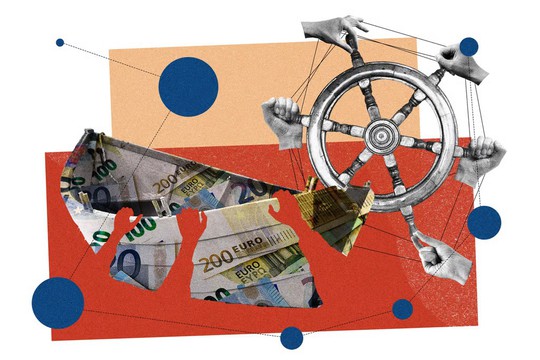Pic.: POLITICO
Northern European countries gather in Vienna to forge a common front ahead of two years of fierce negotiations on the EU’s next seven-year budget, POLITICO notes.
It's the first time that top officials from the EU’s richer countries — including France, Germany and the Nordics — have convened in the same room to build a strategy on the European Commission’s controversial €1.816 trillion budget proposal.
The goal is to assemble a bloc ahead of talks with countries such as Poland, Spain and Italy that favor higher spending, particularly on agriculture and funding to poorer regions.
Since the budget was unveiled on July 16, officials have had just enough time to flick through hundreds of pages and start crunching how much money they’ll gain and lose from the Commission’s new spending plan.
Official budget negotiations have barely begun, but behind the scenes, civil servants from like-minded countries are already plotting.
In every budget negotiation, countries with similar interests gang up to develop common attack lines, hold joint meetings with the Commission and divide up practical tasks like testing the formulas that allocate the money.
The ultimate goal is to outmaneuver the rival camp, win the negotiations and steer the EU’s mammoth budget closer to their priorities.
“In football terms, this is a set piece. It’s something normal,” Polish Member of the European Parliament Janusz Lewandowski, who served as the EU’s budget commissioner from 2010 to 2014, told POLITICO.
L'union fait la force
Instead of everyone fighting for themselves, the EU’s 27 countries coalesce in two broad camps.
On one side are the affluent “net payers” — spanning Sweden to France — who contribute more than they receive from the EU budget and are generally in favor of a slimmer cash pot.
The rival camp, known as the Friends of Cohesion, is a broad alliance of Southern and Eastern European countries including Italy, Spain and Poland that favor a bigger budget — especially when it comes to “cohesion funds” that support poorer regions across the bloc.
“As so many things in the world, the MFF [Multiannual Financial Framework, the EU's long-term budget] is not defined by economics, but by history,” said Stefan Imhof, secretary-general at the Austrian Federal Ministry of Finance, during an event earlier this month.
There are obvious differences within each camp. For example, net-paying France and the Netherlands have wildly different agendas on issues such as EU-level debt, which Paris favors and The Hague opposes.
“At the end, it’s France and Germany agreeing on the figure and us poodles follow through,” said an EU diplomat from a net-paying country with knowledge of the talks who, like others quoted in this story, was granted anonymity to speak freely.
In the other camp, Poland usually takes the lead as the country getting the most money out of the EU budget.
However, Warsaw’s decades-old double act with Hungary — with whom it shares key interests — has been undermined by a rift with Prime Minister Viktor Orbán, whose democratic backsliding at home has led to the Commission withholding billions in funding.
This has opened the door for Mediterranean countries — who also support generous funding for poorer regions — to play a stronger coordinating role inside the coalition.
Seasoned budget negotiators argue that key decisions are taken in these cozy meetings. Last March, net payers agreed to earmark €175 billion for the Horizon research program — which was confirmed by the Commission shortly after — during an informal gathering in Helsinki, according to the EU diplomat.
…This is a very interesting meeting in Vienna. It demonstrates the split in the European Union. The formerly richest EU countries from Western Europe – France, Germany, etc. – are currently experiencing enormous difficulties in balancing their budgets.
The government has just changed in France because it is urgently necessary to cut budget spending, and the Parliament is categorically against it. This means that either a default, or new early parliamentary elections, or even Macron’s resignation are ahead.
In Germany, the budget has begun to form with a huge deficit, which means that many social programs in Germany will be curtailed.
These countries have come up with the idea of balancing their budgets with money from the European Union. 1.8 trillion euros is a huge amount that they can use for the needs of their countries, and not for pan-European projects.
It seems that the strongest EU countries from Western and Northern Europe intend to take the bulk of the money from the pan-European budget for themselves in order to save themselves from financial turmoil. Moreover, they are going to take money from the weakest EU countries.
Does it mean that the European Union is starting to fall apart?
read more in our Telegram-channel https://t.me/The_International_Affairs

 11:24 13.09.2025 •
11:24 13.09.2025 •























